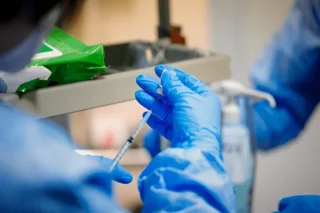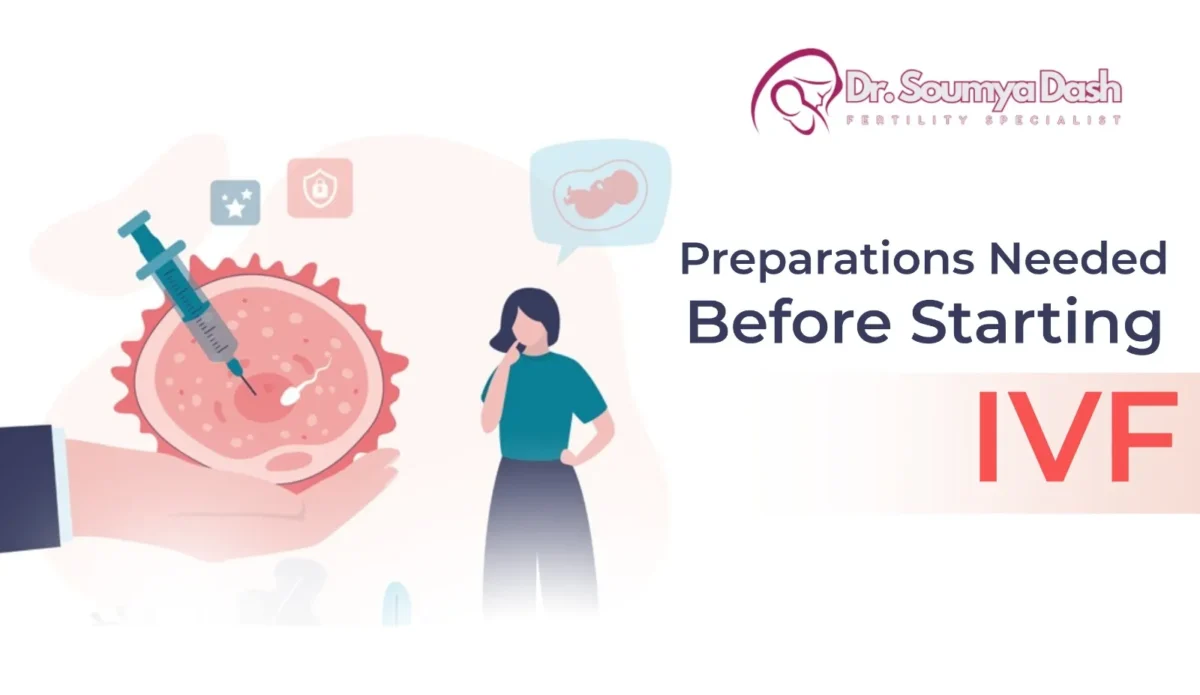Hello Reader!
Welcome to the blog page of Dr. Soumya Dash, the best fertility specialist in Bhubaneswar.
In vitro fertilization (IVF) is a life-changing journey for couples hoping to conceive. While medical advancements have made it more successful, ensuring the right preparations before IVF can significantly increase your chances of success. As the best fertility specialist in Bhubaneswar, I, Dr. Soumya Dash, believe that thorough planning and awareness are the foundation of a healthy and effective IVF cycle.
In this blog, I will walk you through all the essential preparations for IVF that you need to know before starting IVF treatment.

1. Understand the IVF Process Thoroughly
Before starting IVF, it’s crucial to have a clear understanding of the steps involved:
- Ovarian stimulation
- Egg retrieval
- Fertilization in the lab
- Embryo transfer
- Luteal phase support and pregnancy test
Knowing what to expect at each stage can help you prepare mentally and emotionally. As the best fertility specialist in Bhubaneswar, I always advise my patients to educate themselves and clear all doubts in their initial consultation.
2. Complete Medical Assessment
One of the key preparations before IVF is a full medical evaluation for both partners. This includes:
- Hormone profile tests (AMH, FSH, LH, etc.)
- Ultrasound scans to assess ovarian reserve
- Semen analysis for the male partner
- Blood sugar, thyroid, and infectious disease screening
This comprehensive health check ensures you’re physically fit for the IVF journey.
3. Maintain a Healthy Lifestyle
Among the most overlooked yet essential preparations for IVF is your lifestyle. Here are a few tips:
- Quit smoking and alcohol – Both can negatively affect fertility and egg/sperm quality.
- Eat a balanced diet – Rich in antioxidants, proteins, vitamins, and minerals.
- Exercise regularly – Gentle activities like yoga or walking support hormone balance.
- Sleep well – Proper rest helps with hormone regulation.
As the best fertility specialist in Bhubaneswar, I often counsel my patients to adopt a fertility-friendly lifestyle at least three months before starting IVF.

4. Manage Stress and Emotional Health
IVF can be emotionally challenging. Anxiety and stress may impact your body’s ability to respond positively to treatment. Emotional preparations before IVF include:
- Attending counseling or therapy sessions
- Practicing mindfulness or meditation
- Joining IVF support groups to share experiences
Taking care of your mental well-being is as important as physical health.
5. Financial Planning
IVF can be a significant financial commitment. It’s important to be aware of the costs involved and any additional expenses that may arise due to multiple cycles or procedures like ICSI or embryo freezing. At our clinic in Bhubaneswar, we guide couples transparently about pricing, helping them with financial preparations for IVF.
6. Discuss Genetic Testing and Add-on Procedures
Depending on your medical history, your fertility specialist may suggest procedures like:
- Pre-implantation genetic testing (PGT)
- Hysteroscopy or laparoscopy
- Endometrial receptivity analysis (ERA)
Discussing these in advance helps in personalized preparations before IVF.
7. Choose the Right IVF Clinic
Success in IVF depends largely on choosing the right fertility expert and clinic. With advanced infrastructure, a personalized approach, and high success rates, we at our clinic in Bhubaneswar offer world-class fertility care. If you are starting IVF, consult the best fertility specialist in Bhubaneswar for optimal outcomes.
8. Prepare for Possible Outcomes
While IVF brings hope, success isn’t always guaranteed in the first cycle. Setting realistic expectations and being emotionally prepared for both positive and negative outcomes is an essential part of the preparations for IVF.
Also Read: What is IVF Treatment? Is it Safe to Do IVF?

How to Ensure Your Body Is Fully Prepared for Starting IVF Treatments?
Proper preparation can significantly improve your chances of a successful IVF outcome. Here’s a comprehensive guide to help you get your body ready:
1. Schedule Comprehensive Medical Evaluations
- Consult a fertility specialist: Undergo a thorough assessment to identify and address any underlying health issues.
- Complete all recommended tests: This may include hormonal evaluations, ovarian reserve testing, semen analysis (for your partner), and infectious disease screenings.
2. Adopt a Healthy Lifestyle
- Balanced diet: Focus on nutrient-rich foods such as fresh fruits, vegetables, whole grains, lean proteins, and healthy fats. Consider consulting a nutritionist for a personalized plan.
- Maintain a healthy weight: Being either underweight or overweight can affect hormone balance and fertility outcomes.
- Regular exercise: Engage in moderate physical activity like walking, yoga, or swimming. Avoid excessive or high-intensity workouts.
3. Avoid Harmful Substances
- Quit smoking and limit alcohol: Both can negatively impact fertility and IVF success rates.
- Limit caffeine: High caffeine intake may reduce fertility.
- Avoid recreational drugs: These can interfere with reproductive health.
4. Manage Stress and Support Emotional Well-being
- Practice relaxation techniques: Mindfulness, meditation, or gentle yoga can help reduce anxiety.
- Seek support: Join support groups or consider counseling to manage the emotional challenges of IVF.
5. Review Medications and Supplements
- Inform your doctor: Share all medications and supplements you are taking. Some may need to be adjusted or stopped before IVF.
6. Address Any Chronic Health Conditions
- Control conditions like diabetes or thyroid disorders: Proper management is crucial for a healthy pregnancy and IVF success.
7. Prepare Financially and Logistically
- Understand the process: Learn about the steps involved in IVF and plan your schedule accordingly.
- Plan finances: IVF can be costly, so review your insurance coverage and discuss payment options with your clinic.
8. Involve Your Partner
- Partner’s health matters: Encourage your partner to undergo medical evaluation, adopt a healthy lifestyle, and manage stress as well.

What lifestyle changes are recommended as part of preparations for IVF?
Making targeted lifestyle changes before starting IVF can significantly enhance your chances of success and support your overall well-being. Here are the most important adjustments to consider:
1. Nutrition and Diet
- Eat a balanced diet rich in fruits, vegetables, whole grains, lean proteins, and healthy fats.
- Limit processed foods and added sugars.
- Consider prenatal vitamins with folic acid, as advised by your doctor.
2. Maintain a Healthy Weight
- Aim for a BMI within the recommended range for fertility, as being underweight or overweight can impact hormone balance and egg quality.
- Consult a healthcare professional for personalized advice if weight management is needed.
3. Exercise Regularly
- Engage in moderate physical activity such as walking, swimming, or yoga.
- Avoid excessive or high-intensity workouts, which can sometimes disrupt hormonal balance.
4. Avoid Harmful Substances
- Quit smoking and avoid exposure to secondhand smoke.
- Limit or eliminate alcohol consumption.
- Reduce caffeine intake to moderate levels (typically less than 200 mg per day).
- Avoid recreational drugs entirely.
5. Manage Stress
- Practice relaxation techniques like mindfulness, meditation, or gentle yoga.
- Consider counseling or joining support groups to help manage the emotional aspects of IVF.
6. Review Medications and Supplements
- Inform your fertility specialist about all medications and supplements you are taking.
- Only use supplements or herbal remedies with your doctor’s approval.
7. Prioritize Sleep
- Aim for 7–9 hours of quality sleep each night to support hormonal health and overall wellness.

How do specific medical tests contribute to effective preparations for IVF?
Specific medical tests are essential for effective preparations before IVF because they provide a detailed understanding of both partners’ reproductive health, help tailor the treatment plan, and minimize risks during the IVF process.
- Ovarian Reserve Testing: Blood tests for hormones such as AMH, FSH, and estradiol, often combined with an ultrasound, assess the quantity and quality of a woman’s eggs. This helps determine the most suitable medication protocol and predicts how the ovaries might respond to stimulation, directly impacting the chances of IVF success.
- Semen Analysis: Evaluates sperm count, motility, and morphology. Identifying any male factor issues early allows for appropriate interventions, such as ICSI, to be planned if needed.
- Uterine Evaluation: Ultrasound and procedures like hysterosalpingography (HSG) or saline sonohysterogram (SHG) check for structural abnormalities in the uterus and confirm that the fallopian tubes are open. Addressing any detected issues (such as fibroids or polyps) before IVF improves the likelihood of successful embryo implantation.
- Infectious Disease Screening: Both partners are screened for infections (HIV, hepatitis, syphilis, chlamydia, etc.) to prevent transmission to the baby or complications during pregnancy. Treating infections beforehand is crucial for a safe IVF process.
- Genetic Testing: Genetic carrier screening identifies potential hereditary conditions that could be passed to the child. This information guides decisions about embryo selection and additional precautions, especially if there’s a family history of genetic disorders.
- General Health Checks: Blood group, blood sugar levels, and thyroid function tests are performed to rule out medical conditions that could affect fertility or pregnancy outcomes. Managing these conditions before IVF reduces risks and supports a healthier pregnancy.

How do blood tests help identify potential complications before IVF?
Blood tests play a crucial role in identifying potential complications before IVF by providing detailed information about your overall health, fertility status, and risks that could affect the safety and success of the treatment.
- Blood group and Rh factor: Determining your blood group helps identify risks like Rh incompatibility, which can lead to complications during pregnancy but can be managed with appropriate medical interventions.
- Immunity screening: Tests for immunity to infections like rubella (German measles) and varicella (chickenpox) are essential. If you lack immunity, vaccination can be offered before pregnancy to prevent birth defects.
- Infectious disease screening: Blood tests for HIV, hepatitis B and C, and syphilis are performed to prevent transmission to the baby and reduce pregnancy complications. Early detection allows for timely treatment, ensuring a safer IVF process.
- Hormonal testing: Assessing hormone levels (FSH, LH, AMH, estradiol, TSH, prolactin) helps identify imbalances that could impact ovarian function, egg quality, and the response to fertility medications. This enables your doctor to customize your IVF protocol for better outcomes.
- Blood sugar levels: Screening for diabetes or abnormal blood glucose is important, as uncontrolled diabetes can negatively affect fertility and pregnancy outcomes. Addressing these issues beforehand reduces risks.
- Genetic carrier screening: Blood tests can reveal if you or your partner are carriers of genetic conditions that could affect your child. This information allows for counseling, further testing, or preimplantation genetic testing if needed.
- General health checks: Blood tests can also detect anemia and other underlying health concerns that may complicate IVF procedures, allowing for early intervention.
By identifying and managing these potential complications through comprehensive blood testing, your fertility team can optimize your health and increase the likelihood of a successful and safe IVF journey.

FAQ
1. What medical tests are required before starting IVF?
Both partners typically undergo fertility testing, including hormone tests (like AMH, FSH, and LH), ultrasounds, semen analysis, and infectious disease screening. These tests help the fertility specialist create a personalized IVF treatment plan and identify any issues that need to be addressed before starting.
2. How important are lifestyle changes in preparations for IVF?
Lifestyle changes such as maintaining a healthy weight, eating a balanced diet, quitting smoking, limiting alcohol, and managing stress can significantly improve IVF success rates. These adjustments help optimize both partners’ reproductive health before treatment.
3. Should I prepare emotionally before IVF?
Yes, emotional preparation is crucial. IVF can be physically and emotionally demanding, so seeking counseling, joining support groups, and building a support system can help you cope with the stress and emotional ups and downs of the process.
4. What financial planning should I do before starting IVF?
IVF can be expensive, so it’s important to understand the costs involved, explore insurance coverage, and consider payment plans or financing options. Planning your finances in advance helps reduce stress during treatment.
5. How do I choose the right IVF clinic and specialist?
Select a clinic with experienced fertility specialists, high success rates, advanced technology, and positive patient reviews. Meeting with the best fertility specialist in Bhubaneswar can ensure you receive expert care tailored to your needs
Final Words
IVF is a beautiful, scientific blessing that gives countless couples a chance to start their families. However, taking the right preparations before IVF—both physically and emotionally—is the key to enhancing success rates. From health optimization to financial planning and emotional readiness, every small step contributes to a smoother journey.
If you’re planning on starting IVF, connect with Dr. Soumya Dash, the best fertility specialist in Bhubaneswar, for compassionate guidance and expert fertility care.





















